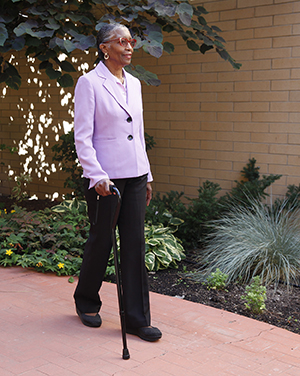Preventing Recurrent Stroke: Getting Active
Being active is key to preventing stroke. It’s good for your heart and lowers high blood pressure. It helps you keep doing independent activities of daily living. Moving around also helps you recover skills lost from the stroke. It’s best if you’re active at least 30 minutes each day. This doesn’t have to be at a gym. The key is finding things that fit your lifestyle and abilities. If you have trouble moving around, your healthcare provider may prescribe physical therapy. The physical therapist can help you develop physical activity goals and give you an exercise prescription. Low- to moderate-intensity aerobic and muscle-strengthening activities are an important part of recovery.

Ways to get moving
After a stroke, you may not be able to do everything you used to. But there are still simple ways you can stay active:
-
Rake leaves or work in the garden.
-
Play with children or grandchildren.
-
Work on a hobby.
-
Park farther away from building entrances and walk.
-
Sweep or vacuum your living space.
-
Use the stairs instead of the elevator. If walking up stairs is too hard, you can start by walking down.
-
If walking is hard, try stretching exercises or swimming.
Walk every day
Walking is great exercise. It’s free, easy, and all you need is a good pair of shoes. Start with short walks. Then go a little farther each week. The tips below can help:
-
Warm up. Start off with a few minutes of strolling. Then walk at a brisker pace.
-
Walk every chance you get. Walk to do errands, for fun, or to visit friends. Visit a local park or explore your neighborhood.
-
Take a friend along. Having company can make it more fun.
-
Walk farther each week. Try walking a little farther or longer each week. You may be surprised by how fast you improve!
When to stop
If you’re new to exercising, it’s normal to feel a little sore afterward. But you should stop right away if you:
Stick with it
Some days it may seem hard to be active. Plan ways to keep going anyway. Your health and life are at stake. Make a list of things that might keep you from exercising. Then write down what you can do to get around those things.
For family and friends
It’s much easier for your loved one to be active when you join in. Try these tips:
-
Go for walks together.
-
Ask your loved one to join in during activities, such as making dinner.
-
If they start making excuses, suggest ways to overcome the roadblocks.
-
Cheer every improvement!
© 2000-2024 The StayWell Company, LLC. All rights reserved. This information is not intended as a substitute for professional medical care. Always follow your healthcare professional's instructions.